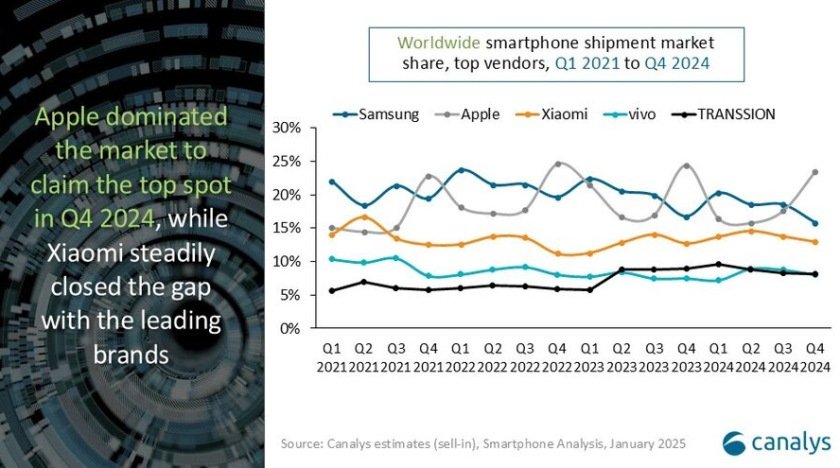Apple (23 percent share), Samsung (16 percent), Xiaomi (13 percent), Transsion (8 percent), Vivo (8 percent) and Others (32 percent) are the leading smartphone brands in Q4 2024, according to Canalys report.

Apple’s ability to maintain its leadership in the global smartphone market in 2024 was driven by strategic actions that leveraged emerging markets, branding, and innovation. Expanding its presence in regions like India and Southeast Asia, Apple capitalized on the growing middle class and demand for premium devices.
Apple has tailored marketing campaigns to local contexts, making the brand aspirational and relatable. The introduction of competitively priced products, such as older-generation iPhones and the iPhone SE, further strengthened its foothold in these markets while encouraging users to enter its premium ecosystem.
Apple’s focus on product innovation has been critical, offering hardware upgrades in areas like camera technology, battery life, and processing power to incentivize upgrades. The integration of AI-powered features through Apple Intelligence enhances user experiences in productivity, photography, and health monitoring, helping the brand differentiate itself. By expanding its range of accessories, such as Apple Watch and AirPods, Apple fosters loyalty within its ecosystem, ensuring users are more likely to stay engaged.
Trade-in programs have made it easier for customers to adopt newer models, especially in price-sensitive markets, while the company capitalizes on shifting consumer preferences in mature markets where demand for premium devices with higher average selling prices continues to grow. Exclusive features in flagship devices, particularly the Pro models, ensure Apple retains its premium appeal.
To navigate supply chain challenges and geopolitical tensions, Apple continues to invest in vertical integration, including in-house chip design for greater control over costs and performance. Strategic partnerships with suppliers ensure stability and mitigate risks in volatile markets. Sustainability initiatives, such as commitments to carbon neutrality and the use of recycled materials, resonate with environmentally conscious consumers and reinforce Apple’s brand values.
Marketing excellence and an exceptional customer experience remain central to Apple’s strategy. The company creates immersive brand experiences through flagship stores and personalized marketing communications that enhance loyalty. It is also leveraging broader technological trends like AI, augmented reality, and 5G to future-proof its offerings and maintain its competitive edge. Flexible inventory management practices enable Apple to respond to fluctuations in demand while avoiding overstocking, and its targeted regional strategies help counter competitors in key markets like Asia and Africa.
By maintaining a strong focus on innovation, ecosystem expansion, and adaptability to market dynamics, Apple is well-positioned to sustain its leadership and capture new growth opportunities in 2025 and beyond.
“Apple solidified its global position through growth in emerging markets like India and Southeast Asia in 2024,” Canalys Analyst Le Xuan Chiew said.
Baburajan Kizhakedath
